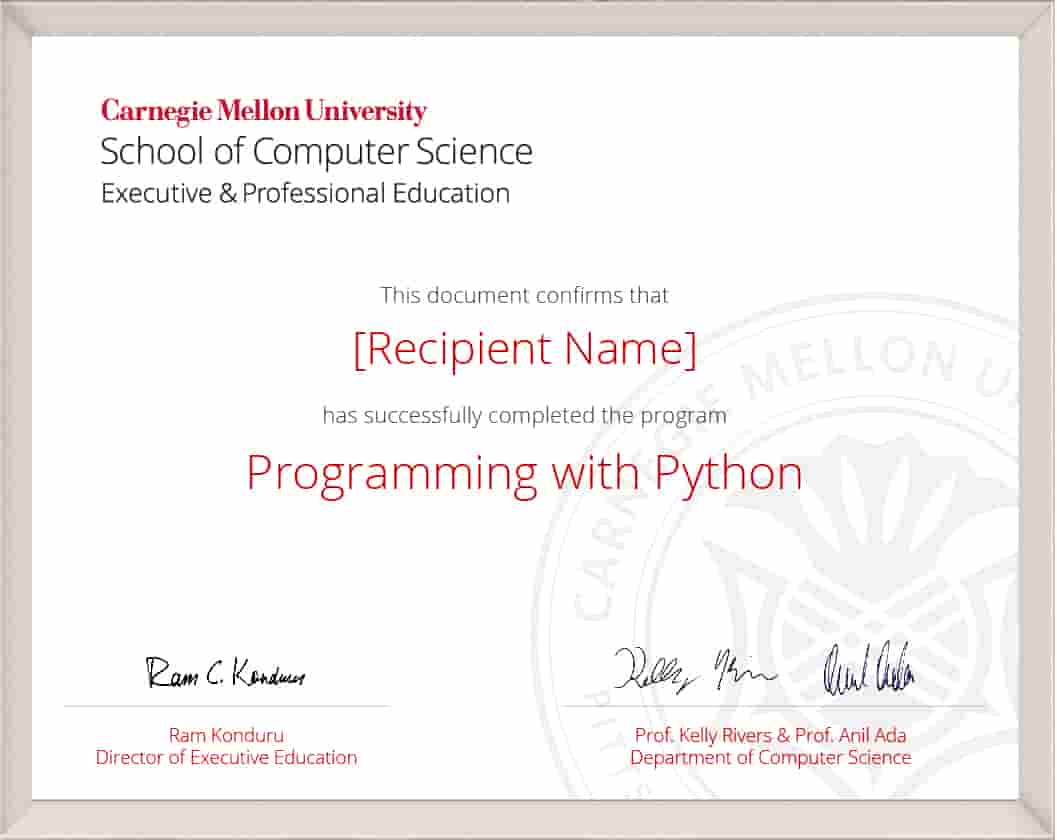The benefit of learning together with your friend is that you keep each other accountable and have meaningful discussions about what you're learning.

Courtlyn
Promotion and Events Specialist
Write effective Python code for solving complex business problems
Download Brochure
TBD
10 weeks, online
5-10 hours per week
Participants report that enrolling in a program with colleagues fosters collaborative learning and amplifies their impact.
Please provide your details to get more information about the group-enrollment pricing.
The benefit of learning together with your friend is that you keep each other accountable and have meaningful discussions about what you're learning.

Courtlyn
Promotion and Events SpecialistPython’s scope is nearly limitless. Data scientists, engineers, and developers are flocking to Python because it is versatile for applications ranging from web development to data science and from artificial intelligence to cybersecurity. In this program, you will learn the essentials of Python coding*:
*Note: No prior programming knowledge is required.
Designed as an online program focused on writing code using common structures in the Python programming language, content is shared via recorded faculty videos and live office hours with learning facilitators.

Office Hours with Learning Facilitators

Demonstrations

Coding Exercises in Each Module

Bite-Sized Learning

Knowledge Checks

Dedicated Program Support Team

Mobile Learning App

Peer Discussion

Capstone Project

Bonus Content on Advanced Topics
Python is a good starting point for first-time coders. It uses simple, natural language syntax, almost like spoken English. It is powerful and it is versatile, favored by such diverse industry giants as Netflix, PayPal, NASA, Disney, and Dropbox. Python is used by 87% of data scientists.
sources: generalassemb.ly
This online program is designed for anyone who is interested in acquiring programming skills in Python. No prior programming knowledge is required.

Upon successful completion of the program, participants will receive a verified digital certificate of completion from Carnegie Mellon University’s School of Computer Science Executive Education. This is a training program and it is not eligible for academic credit.
Download BrochureYour digital certificate will be issued in your legal name and emailed to you at no additional cost, upon completion of the program, as per the stipulated requirements. All certificate images are for illustrative purposes only and may be subject to change at the discretion of Carnegie Mellon University’s School of Computer Science Executive Education.
After reviewing the information on the program landing page, we recommend you submit the short form above to gain access to the program brochure, which includes more in-depth information. If you still have questions on whether this program is a good fit for you, please email learner.success@emeritus.org, and a dedicated program advisor will follow-up with you very shortly.
Some programs do have prerequisites, particularly the more technical ones. This information will be noted on the program landing page, as well as in the program brochure. If you are uncertain about program prerequisites and your capabilities, please email us at the ID mentioned above.
Note that, unless otherwise stated on the program web page, all programs are taught in English and proficiency in English is required.
More than 50 percent of our participants are from outside the United States. Class profiles vary from one cohort to the next, but, generally, our online certificates draw a highly diverse audience in terms of professional experience, industry, and geography — leading to a very rich peer learning and networking experience.
Check back to this program web page or email us to inquire if future program dates or the timeline for future offerings have been confirmed yet.
Each program includes an estimated learner effort per week. This is referenced at the top of the program landing page under the Duration section, as well as in the program brochure, which you can obtain by submitting the short form at the top of this web page.
We have designed this program to fit into your current working life as efficiently as possible. Time will be spent among a variety of activities including:
The program is designed to be highly interactive while also allowing time for self-reflection and to demonstrate an understanding of the core topics through various active learning exercises. Please email us if you need further clarification on program activities.
More than 300,000 learners across 200 countries have chosen to advance their skills with Emeritus and its educational learning partners. In fact, 90 percent of the respondents of a recent survey across all our programs said that their learning outcomes were met or exceeded.
All the contents of the course would be made available to students at the commencement of the course. However, to ensure the program delivers the desired learning outcomes the students may appoint Emeritus to manage the delivery of the program in a cohort-based manner the cost of which is already included in the overall course fee of the course.
A dedicated program support team is available 24/5 (Monday to Friday) to answer questions about the learning platform, technical issues, or anything else that may affect your learning experience.
Peer learning adds substantially to the overall learning experience and is an important part of the program. You can connect and communicate with other participants through our learning platform.
Each program includes an estimated learner effort per week, so you can gauge what will be required before you enroll. This is referenced at the top of the program landing page under the Duration section, as well as in the program brochure, which you can obtain by submitting the short form at the top of this web page. All programs are designed to fit into your working life.
This program is scored as a pass or no-pass; participants must complete the required activities to pass and obtain the certificate of completion. Some programs include a final project submission or other assignments to obtain passing status. This information will be noted in the program brochure. Please email us if you need further clarification on any specific program requirements.
Upon successful completion of the program, you will receive a smart digital certificate. The smart digital certificate can be shared with friends, family, schools, or potential employers. You can use it on your cover letter, resume, and/or display it on your LinkedIn profile.
The digital certificate will be sent approximately two weeks after the program, once grading is complete.
No, only verified digital certificates will be issued upon successful completion. This allows you to share your credentials on social platforms such as LinkedIn, Facebook, and Twitter.
No, there is no alumni status granted for this program. In some cases, there are credits that count toward a higher level of certification. This information will be clearly noted in the program brochure.
You will have access to the online learning platform and all the videos and program materials for 12 months following the program start date. Access to the learning platform is restricted to registered participants per the terms of agreement.
Participants will need the latest version of their preferred browser to access the learning platform. In addition, Microsoft Office and a PDF viewer are required to access documents, spreadsheets, presentations, PDF files, and transcripts.
Yes, the learning platform is accessed via the internet, and video content is not available for download. However, you can download files of video transcripts, assignment templates, readings, etc. For maximum flexibility, you can access program content from a desktop, laptop, tablet, or mobile device.
Video lectures must be streamed via the internet, and any livestream webinars and office hours will require an internet connection. However, these sessions are always recorded, so you may view them later.
Yes, you can register up until seven days past the published start date of the program without missing any of the core program material or learnings.
The program fee is noted at the top of this program web page and usually referenced in the program brochure as well.
Yes, you can do the bank remittance in the program currency via wire transfer or debit card. Please contact your program advisor, or email us for details.
Yes! Please email us with the details of the program you are interested in, and we will assist you.
Please email us your invoicing requirements and the specific program you’re interested in enrolling in.
Yes, the flexible payment option allows a participant to pay the program fee in installments. This option is made available on the payment page and should be selected before submitting the payment.
Please connect with us via email for assistance.
Emeritus collects all program payments, provides learner enrollment and program support, and manages learning platform services.
For the program refund and deferral policy, please click the link here.